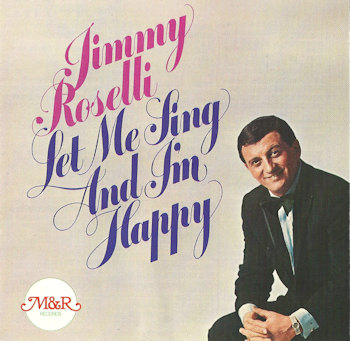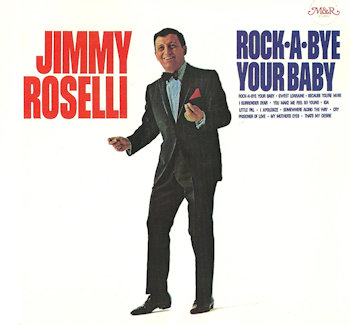
Jimmy Roselli
in his prime
Ma Blushin' Rosie
Rock-A-Bye Your Baby With A Dixie Melody
Little Pal
 Jimmy Roselli in his prime |
|
Hear Jimmy Roselli sing these Jolson songs:
|
|
Ma Blushin' Rosie |
|
Rock-A-Bye Your Baby With A Dixie Melody |
|
Little Pal |
By Margalit Fox
July 10, 2011
He was a skinny Italian-American kid from Hoboken, N.J., who could croon like an angel. Before long, his singing made women swoon and grown men cry. For decades, he sang standards to adoring crowds worldwide, including, notably, “My Way.”
He had brown eyes.
Jimmy Roselli, a pop singer widely known as the other crooner from Hoboken, spent his life in the long, slim shadow of Francis Albert Sinatra. But in many traditional Italian-American communities in the Eastern United States he was as fiercely venerated as Sinatra, if not more so.
Mr. Roselli, who continued performing until he was nearly 80, died on June 30, at 85. The cause of his death, at his home in Clearwater, Fla., was complications of a longtime heart ailment, his agent, Alan Salomon, said.
Almost entirely self-taught, Mr. Roselli had a lush, quasi-operatic tenor and impeccable diction. He belonged to the generation of Italian-American pop singers that besides Sinatra included Perry Como, Dean Martin (né Dino Crocetti) and Tony Bennett (Anthony Benedetto).
But though he sang in storied nightclubs like the Copacabana in New York, appeared on television and made dozens of recordings, Mr. Roselli was far less well known than they.
This obscurity, he long maintained, was brought about through the combined efforts of Sinatra, with whom he had an enduring feud, and local underworld figures, who, when they weren’t weeping along to his sentimental Italian hits, were, he often said, threatening him with a hit of another kind.
But in the end, the single greatest impediment to Mr. Roselli’s career appears to have been Mr. Roselli himself. Through a combination of constitutional abrasiveness, Old World suspicion of the entertainment business and a deep-seated fear of success, people who knew him have said, he managed to torpedo nearly every opportunity that came his way.
Michael John Roselli was born in West New York, N.J., on Dec. 26, 1925. His mother died two days after giving birth to him; his father, a prizefighter, abandoned him soon afterward. He was reared in a cold-water flat in Hoboken by his grandfather, a longshoreman who spoke only Italian, and his four aunts. (The young Mr. Roselli was known as Mickey until he was in his 20s, when an agent, thinking the name unrefined, changed it to Jimmy.)
By the time he was 9, he had developed a fine voice. Carrying a shoeshine kit, which gave him plausible access to local saloons, he sang for change. At 13, he won first prize on the radio talent show “Major Bowes’ Original Amateur Hour.” At 18, he went into the Army, serving in Europe during World War II.
He began his career in earnest after the war. He became known for English-language standards like “There Must Be a Way” and “When Your Old Wedding Ring Was New” but was most famous for lachrymose Neapolitan songs like “Torna a Surriento” (“Come Back to Sorrento”) and “Malafemmena” (“Bad Woman”), which he rendered in fluent Neapolitan dialect.
 In performance, his ready emotionalism stood in stark contrast to Sinatra’s studied cool. “He was not a nuanced singer; he was a heartfelt singer,” David Evanier, the author of “Making the Wiseguys Weep: The Jimmy Roselli Story” (1998), said in an interview on Wednesday. “Jolson was his hero, and he sang many Jolson songs.”
In performance, his ready emotionalism stood in stark contrast to Sinatra’s studied cool. “He was not a nuanced singer; he was a heartfelt singer,” David Evanier, the author of “Making the Wiseguys Weep: The Jimmy Roselli Story” (1998), said in an interview on Wednesday. “Jolson was his hero, and he sang many Jolson songs.”
By Mr. Roselli’s own account and many published ones, mobsters adored him — at least some of the time. “He sang at John Gotti Jr.’s wedding, and he sang the wiseguy anthem ‘Little Pal’ ” — a song popularized by Jolson — “about how when Daddy goes away, you have to be a good little boy to your mother,” Mr. Evanier said. “His greatest fan was Carlo Gambino, who cooked for him.”
At other times, though, Mr. Roselli appeared to bite the hands that fed him by refusing to share his earnings. “They ran all the clubs,” Mr. Evanier explained. “They’d skim off the top, and they weren’t able to do that frequently with him.”
By the late 1960s, Mr. Roselli had antagonized enough people to have committed a measure of professional suicide. Among them was Sinatra, whose mother Mr. Roselli was said to have offended after he demanded a large fee to sing at a charity benefit she was organizing. Suddenly, according to many published accounts, his recordings vanished from jukeboxes, club dates dried up and he received little radio play.
 There were other instances of seeming self-sabotage. Saying he was being underpaid, he quit a seven-show booking on “The Ed Sullivan Show” after only three shows. On similar grounds, he passed up appearances on “The Tonight Show Starring Johnny Carson,” a role in “The Godfather: Part II” and many other offers.
There were other instances of seeming self-sabotage. Saying he was being underpaid, he quit a seven-show booking on “The Ed Sullivan Show” after only three shows. On similar grounds, he passed up appearances on “The Tonight Show Starring Johnny Carson,” a role in “The Godfather: Part II” and many other offers.
Think of the exposure, his friends would say. From exposure, Mr. Roselli replied, you get pneumonia.
He did appear on Broadway, sharing an old-style vaudeville bill with the comedian Pat Cooper at the Palace Theater in 1969, and he sang at Carnegie Hall.
Mr. Roselli’s first marriage, to Angeline Giuffra, ended in divorce. His survivors include his second wife, the former Donna Tumolo; a daughter, Anne, from his first marriage; and a grandchild.
Late in life, Mr. Roselli enjoyed something of a renaissance. He sang regularly in Atlantic City, commanding, Mr. Evanier said, $100,000 a night or more. And even now, he said, in many a New York Italian restaurant, Mr. Roselli beams down from a framed photograph on the wall as his voice wells up from the jukebox.
|
Updated 23 Apr 21 |